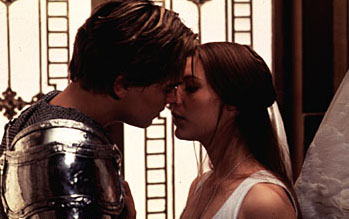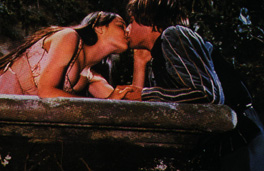
This page contains several reviews of Shakespeare-themed movies and books. More to come, as I add them. Into the breach!
Books
Wow.
I'll say it backwards: Wow.
I know Saving Private Ryan is a near shoo-in at Oscar time, and I'm sure it deserves to be (haven't seen it yet, though). But this would be my pick for Best Pic. Its script is wildly inventive and full of humor (its co-author, Tom Stoppard, is no stranger to variations on Shakespeare themes--he wrote Rosencrantz and Guildenstern Are Dead). The best moments in the script are things that make references to well-known Shakespeare facts and quotes. Will angrily mutters "Words, words, words!" as Hamlet eventually will. There is another reference to the ghost of Hamlet's father appearing to Hamlet. We find the reason why so many of Shakespeare's plays have the plot device of a girl dressing as a boy. And, most of all, we see the inspiration for Romeo and Juliet.
The young playwright, Will Shakespeare (living in London, away from his unhappy marriage to Anne Hathaway) is struggling to write a comedy, since he is sure that is what the people want. He's trying to jazz up his concept "Romeo and Ethel, the Pirate's Daughter." (Scares me to think that might have been all we were left with). However, he soon meets Lady Viola De Vere, soon to enter a loveless marriage at the queen's command. His love for the girl, who is enamored of his poetry and dresses like a boy to join his company, takes the play he is writing in a different direction. Another nice touch is that we see the analogous scenes to Romeo and Juliet taking place in Will's life (the balcony scene, the sympathetic nurse, the parting at dawn). The best scene shows "Thomas Kent" (Viola's alter-ego) acting as Romeo in the balcony scene onstage, intercut with scenes of her and Will reciting the lines to each other as they make love. Only now he takes Juliet's lines, and she Romeo's.
Her jealous betrothed is an obstacle, as are the social and cultural barriers. She would no doubt be willing to surmount them, except for the Queen's command: "If I do not marry Wessex, the queen will know the reason why, and there will be no more Will Shakespeare." Add to this a wager that the Queen has made that no one can show the true nature of love in a play, and there is a heady mix. And as the doomed nature of his love becomes more and more apparent to Will, the play becomes a tragedy. The final performance of the play, with Will as Romeo and Viola (supposedly a boy playing a girl) as Juliet, are full of the pain they both feel. And as the movie ends, the love Shakespeare feels for this remarkable woman inspires him to begin yet another play.
The writers have fun playing with some old stories, such as the reason why Will has so many different signatures, and the old saw about people spreading cloaks over mud puddles for the Queen. The acting is superb, with the leads, Joseph Fiennes and Gwyneth Paltrow, projecting pure passion. The supporting cast is likewise excellent, from Geoffrey Rush as the fatheaded Henslowe, owner of the Rose Theatre (this was pre-Globe) to Judi Dench's arch Queen. Of course, it plays havoc with history, but that hardly matters when we are presented with a movie as charming and touching as this. This is the movie I wish I'd written.

I used to be very, very leery of Shakespeare in modern dress. That was before we did those projects of acting out the comedies in any setting we chose. I grew to realize that such a performance actually did audiences a favor, freeing the characters from the old dusty stereotypes, and making them realize that these stories are indeed timeless and that the poetry resonates no matter what setting it's in. It forces us to look at Shakespeare in a new way. Nevertheless, I was slightly skeptical about this movie version of Romeo and Juliet when I first heard of it: "Didn't they already do this and call it West Side Story?"
Seeing it, though, was enough to lay any doubts to rest. The urban setting of Baz Luhrmann's version forces us to see the play once again as Shakespeare intended it...away from pretty settings and costumes, it once again shows us the power and importance of love in a flawed world. Much as I love the Zeffirelli version, it can be hard to think of the feud as ugly and violent in such a beautiful and lush setting. This makes us realize that yes, such feuds are ugly, and violent, and take lives. And they still happen. It makes love seem all the more necessary.
In this version, the Capulets and Montagues are rival business clans, whose hatred has seeped down to their younger generation, who battle it out in the streets. Romeo and Juliet are untouched by this, and when they meet at the Capulet costume party, dressed as a knight and an angel, it's heart-stoppingly intense. Even their costumes seem to reflect purity and chivalry against all the other garish and decadent costumes (such as the elder Capulet in his Caligula outfit, or Tybalt and his bunch dressed as devils and ghouls).
Much has been made of the prevalent Catholic images in the film. You'll notice that the young battlers have religious symbols on their guns and clothing. I believe that this shows a subtext of just who the "god" is for all these people. For the elder Capulet and Montague, it is power. For the younger ones, it is also power, which translates into violence for them...violence is a way of gaining power. There is a Virgin Mary painted on Tybalt's gun because he worships it, and all it represents. Only the young lovers, aided by Father Lawrence, put spirituality where it truly belongs...in love.
If you look at the very end of the closing credits, underneath the film's logo, there are three symbols...a skull, a heart, and a gun. This underlines the three main themes of this movie...violence, love, and death. The love, surrounded by violence and death, manages to shine. Perhaps it is all that can end this violence.
This is, I believe, the subtext of the film...the need for love to survive if we're to overcome all the hate and violence that surrounds us. The purity of the young lovers seems to stand out in all the chaos around them, and we wish that it can survive. Although it does not, the speech by the Prince and by the newscaster at the end seems to remind us that we must let it survive in our own lives. Only when love takes precedence over power and violence will we be able to accomplish much. Even this love, as in West Side Story, has accomplished something...it has ended one fight. And, if it has ended even one fight, can it truly be said to have failed?

The first Shakespearean movie I ever saw, of the first Shakespeare play I ever read. No wonder it's among my favorites. As I said in the Plays section, the tradition was once to cast much older actors as Romeo and Juliet. The old joke used to go that no actress was old enough to play Juliet until she was old enough to play Juliet's nurse. This, to my mind, was a mistake, because the whole idea of youth and its impetuousness was CENTRAL to the play. You can cast Patrick Stewart as a white Othello with a black cast, since that doesn't undermine the underlying contention of the play that Othello is the different one, the outsider. (That's why Desdemona had to go through so much trouble to marry him.) But the idea of the extreme youth of the lovers motivates every action they make. The impetuousness of youth is what causes Romeo to charge right into killing Tybalt. George Cukor, an excellent director in his own right, cast Leslie Howard and Norma Shearer, fast approaching middle age, as the seventeen- and fourteen-year-old lovers. I've never seen it, but it just seems to lose something in the translation for me. Not only are they too old for the roles, but I'll always associate Leslie Howard with Ashley Wilkes, the wimp that Rhett Butler could have eaten for breakfast, and nowhere near worthy of a strong-willed woman like Scarlett. It would probably be tough for me to believe in him as a headstrong, fiery lover. It's like all those black-and-white fifties movies about campus life where the dewy young college students look as though they're on the verge of a midlife crisis.
Franco Zeffirelli changed all that. He cast two young unknowns as the lovers, and they couldn't have looked the part more. More importantly, they act the part well...we believe in every word these two are saying. They are human: during the balcony scene, when Juliet leaves for a moment, Romeo giddily swings from the tree branch; moments later, he capers through the forest on his way to Friar Laurence's, shouting with glee in the joy of his new love, even sliding down a dewy hillside. Juliet, while keeping her practicality and common sense, does have some rather "teenagerish" moments; when her mother informs her of the impending marriage with Paris, she sounds more like a young girl having a tantrum than an indignant woman who doesn't want choices forced upon her. Such moments make us believe, even more than the dialogue, that these are real teenagers in love, not stately literary characters.
The setting, on location in Italy, is gorgeous; one really believes that this is the Renaissance. You can almost feel the hot sun just before the brawl scene. (Although, as I said in the previous review, such a gorgeous setting sometimes seems to distract a bit from the fact that this feud is ugly.) The supporting cast does a superb job; one especially nice touch is that Lady Capulet (Natasha Parry) seems vain of her looks, and young enough to be so. It reminds us that this woman was herself a mother at fourteen, and that it can't be very happy for her, married to such an older man. No wonder that she has such an unromantic view of marriage. There is also a moment right after the Queen Mab speech when Mercutio (John McInerney) winds down, his voice quivering. It seems to be a hint that there may be great unhappiness and loneliness beneath the life-of-the-party behavior. Maybe he acts so witty all the time in order to gain attention...and charges into his brawl with Tybalt for the same reason. Best of all is the Nurse, who looks and speaks EXACTLY as I imagined when I read the play.
Another touch that surprised and pleased me when I first saw this was the fact that the Tybalt/Mercutio battle is actually playful when it starts. It fits in perfectly with Mercutio's character. It seems like this is a game for both of them, with both sides shouting out joking encouragements. Then Tybalt loses his temper for a moment and runs Mercutio through...and (an especially nice element) he is shocked and remorseful as his friends hurry him away. It shows that Tybalt may not be just an angry hothead...that he really didn't want to kill. Then, when Romeo seeks out his brawl with Tybalt, Tybalt is all the angrier at Romeo for "causing" the duel which made him, Tybalt, a murderer. Furthermore, there is one especially good (and blackly comic) element about the fight scene...after Mercutio's wounded, all through his dying and the "A plague on both your houses!" speech, even after he dies, HIS FRIENDS STILL THINK HE'S KIDDING! Romeo and Benvolio are the first to realize that this is serious; they check on the body while the others still laugh, waiting for Mercutio to sit up and laugh with them...then Romeo uncovers the wound and they gasp. It's a fascinating twist, and fits in so well with Mercutio's character...he would be the type to fake all this to fool his friends.
I don't have to tell anyone who's seen this that this is also the first known version to show Romeo and Juliet in bed together after their marriage (it was hinted at before, but left to the imagination). This also strengthens the idea of the youth and passion of the lovers. (Warning to teachers: this scene does include a glimpse of Olivia Hussey's ta-tas.)
There are a few flaws with the movie as compared to the play...mainly in some of the cuts they made. For example, I wasn't crazy about them cutting Juliet's speech before drinking the potion that knocks her out. In one way, the speech makes her seem vulnerable, showing her nervousness as she almost calls for her nurse. It also, once more, shows her sharp-mindedness as she tries to consider all that may go wrong before taking this step. Cutting it seems to make her less clear-minded. For the same reasons, I didn't really like them cutting her speech after Tybalt's death...it merely ends with "Wherefore, villain, didst thou kill my cousin?" even though she's already forgiven Romeo. It doesn't include her line directly after, "That villain cousin would have killed my husband," and her calming herself down, realizing that it is better this way. These cuts seem to take away a little of Juliet's maturity.
These are nit-picks, though; this is a fine film for novice Bardolaters to start out with, just as the play is a good first Shakespeare play.
The Friendly Shakespeare (Norrie Epstein) 
This book is still widely available; I've seen it in Barnes & Noble. It's also in many public libraries, which is how I was introduced to it.
Every student who is starting out with Shakespeare should read this book. Every teacher who is about to teach Shakespeare should read this book (to discover the right and wrong ways to teach Shakespeare). Norrie Epstein makes William Shakespeare and his world come alive. She, like myself, doesn't cover all the plays, just the best ones or the ones that she feels reveal something about the author. And, like myself, she doesn't so much summarize as comment on the plays. She is vehement about the right ways to present Shakespeare; she insists that one of the reasons that Shakespeare is so disliked among students is that the teachers don't teach the right plays. Instead of the sparkling, witty, and often bawdy comedies, which would capture students' attention so much more, teachers present students with Julius Caesar, which Epstein strongly dislikes. (To my mind, that is redeemed only by the scene between Brutus and Portia, the murder itself, and Antony's funeral oration. Otherwise...it drags.)
Even better, Epstein includes sections on the social, political, and historical climate of the time. She explains, for example, why Shakespeare was duty-bound to present Richard III as a monster (a portrayal which may have distorted history): the man who dethroned Richard, Henry VII, was Queen Elizabeth's ancestor. Had he not portrayed Richard as evil, the Queen would have been most wonderly wroth (translation: off with Will's head).
Best of all are Epstein's interviews with Shakespeare scholars and Shakespearean actors. She speaks at one point with David Suchet, better known as Hercule Poirot on Mystery, and who also played Shylock. He explains that when Shakespeare wrote of Shylock's forced conversion to Christianity, the author actually meant to show Shylock's redemption; he claims that Elizabethan audiences would have translated it this way, and that "we must not look at Shylock through the perspective of the Holocaust."
The clear and easily understandable commentary by the author and the different perspectives on characters that interviewees give make this an enjoyable read and a good encapsulation of the author, his works, and his world. This is an absolute must for anyone even wishing to get involved with the Bard.
I don't know if this anthology is in print anymore. If not, it should be. This is a fascinating book of stories by many different authors, each doing some variations on Shakespearean themes. They are as diverse as speculations about the Bard's life and science-fiction settings of Shakespeare. I summarize, below, the ones I like best.
"An Augmentation of Dust" (Diana L. Paxson)--A weary and writers-blocked Shakespeare receives inspiration for his tragedies from a supernatural source. This is fascinating because of the speculations of Shakespeare's life and the sources that may have inspired him.
"The Will"(Barbara Denz)--A historical speculation of the anger and resentment that Judith Shakespeare might have held for her father (since he left the family to live for awhile in London) and how it carried over even to the playwright's deathbed.
"Ancient Magics, Ancient Hope"(Josepha Sherman)--We saw Owen Glendower briefly in Henry IV, Part I, as one who claimed to know sorcery. This merges the play's character, Welsh legend, and history to pit him against Merlin himself.
"Queen Lyr"(Mark Kreighbaum)--This takes the story of King Lear and places it in the arachnid kingdom, showing that there is more to those intricately developed spider webs than just fly-catching.
"The Tragedy of Gertrude, Queen of Denmark"(Kate Daniel)--This utterly captivating story gives the real story behind Hamlet, suggesting that Horatio's telling of the tale corrupted the story to the point that Shakespeare presented it in. In this version, Gertrude is freed from her loveless marriage to the mad King Hamlet by the king's suicide, after he has falsely accused her of adultery with his brother. Because of duty to the throne, she marries the new king, and finds love with him. But the old king's ghost vengefully corrupts the Prince's mind with a tale of murder. This presents the tale as seen through the eyes of a character who is too often reviled, and also introduces the idea of a conflict between Christianity and the old Norse gods, an element that was not part of the play.
"Alas, Me Bleedin..."(Dennis McKiernan)--Another idea behind the "real" story of Hamlet. Details the thoughts of poor Yorick after his skull is unearthed. To get even with Hamlet, he travels back a few days in time and allows his spirit to take on a form Hamlet knows well...
"The Muse Afire"(Laura Resnick)--Poor Will Shakespeare needs the inspiration of his muse (who sounds suspiciously New Yorkish.) He wants to write a play about Henry VII, Richard III's successor, but as his muse reminds him, a guy who does nothing but pray and act noble doesn't make for much interesting drama. They, and the vain and mercenary Richard Burbage, discuss the possibility of Henry V for the new play...This wonderful and funny story has lots of in-jokes for the Shakespeare buff.
"Titus!"(Esther M. Friesner)--This is a future where artificial intelligence and space travel are commonplace, but happily, the old classics of literature and culture still flourish. Earth is on the verge of acceptance into the "Pangalactic Union of Sentients" (P.U.S.) They are to present a play to the heads of it; its envoys suggest "Titus Andronicus", widely regarded as one of the only total duds Shakespeare wrote (but not exactly boring); as if that weren't bad enough, they want it turned into a musical. To help them, the consciousness of Shakespeare is revived, via artificial intelligence, and placed in an android body. He discovers the plot of the envoys to humiliate Earth. I absolutely dare you not to fall on the floor laughing at the scenes in which Will sees what they have done with his play ("Titus may be swill, but it's MY swill, as I wrote it!"). Despite its humor, this has a very true message regarding the importance of communication, and "the power of words. Only words."
"The Summer of My Discontent"(Mike Resnick)--A director decides to jump on the bandwagon of Shakespearean films. You won't believe some of the casting decisions he tries to make (Arnold as Macbeth!) and the solution he finally comes to.
"The Mercury of the Wise"(Kevin A. Murphy)--Remember Rosaline, who Romeo had a crush on before he saw Juliet? This story is told from her point of view. It seems that she and Mercutio had a little thing going. Through sorcery, they are responsible for the sudden love between Romeo and Juliet. Then, after Mercutio is killed, a little more sorcery goes on, courtesy of Mistress Rosaline...For everyone who desperately hoped for a happy ending to Romeo and Juliet, this wonderful tale is for you. (Some wonderfully bawdy puns between Mercutio and Rosaline, too!)
"A Tempest in her Eyes"(Charles de Lint)--A young poet wonders why all the joy and wonder seems to have gone from her life. A dream of Puck shows her how to recapture the wonder that permeates this world. A beautifully written tale that has an important, and very true, message...we should not lose sight of wonder, for it is in all things, and sometimes it is best to think with the heart and not the mind.
"Titania or the Celestial Bed"(Teresa Edgerton)--It's the 1700s, and the fairies now live in the cities, concealing their true nature from all but their own kind. Titania is upset over Oberon's latest infidelity. A visit to Doctor Prospero's temple of healing, complete with the famous Celestial Bed (based on an actual invention) helps her to recover passion, despite her discovery of a deception. This is beautiful, and the "footnotes", of the kind so dear to Shakespeareans, are quite funny.
"The Elements so Mixed"(Adrienne Martine-Barnes)--An ambassador to an alien planet is escorted to a play to be performed in her honor. But why does the plot written by their most revered playwright sound so familiar? A most interesting premise...what if it's really true?...and a reminder of the truths that bind all beings together.
"My Voice Is In My Sword"(Kate Elliot)--A troupe of actors who are performing a play on an alien world are irritated by the intrusion of the holo-movie "star" who is playing Macbeth. This star is rude, sadistic, sexist and has an ego that makes the Wicked Queen from Snow White look self-abasing, but the director must put up with him because his studio is bankrolling the performance. The empathic aliens sense the cast's hatred of this boor, and decide to aid the performance in an unusual way...
As I said, these are not all the stories, only the ones I like best. That would, however, cover the majority of them. They are inventive and witty, and definitely not to be missed.
Back to the Will Power! homepage
This page is hosted by GeoCities. Get your own free home page here.